Laugh Lines
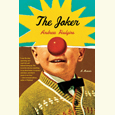 July 24, 2013 Andrew Hudgins is a distinguished poet and scholar, and he’s also a lifelong, inveterate teller of jokes. In his memoir, The Joker, he tells the story of his life through the jokes that marked its passages. Today he talks with Chapter 16 about what makes a great joke and why we need to look at the ugly side of humor. Hudgins will appear on July 27, 2013, at 4:15 p.m. at the Bairnwick Women’s Center on the campus of The University of the South in Sewanee. The event, part of the Sewanee Writers’ Conference, is free and open to the public.
July 24, 2013 Andrew Hudgins is a distinguished poet and scholar, and he’s also a lifelong, inveterate teller of jokes. In his memoir, The Joker, he tells the story of his life through the jokes that marked its passages. Today he talks with Chapter 16 about what makes a great joke and why we need to look at the ugly side of humor. Hudgins will appear on July 27, 2013, at 4:15 p.m. at the Bairnwick Women’s Center on the campus of The University of the South in Sewanee. The event, part of the Sewanee Writers’ Conference, is free and open to the public.

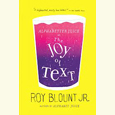 July 23, 2013 In 2008, Vanderbilt graduate and popular humorist Roy Blount Jr. became a modern-day Samuel Johnson with his twentieth book, Alphabet Juice, an eclectic—and often hysterical—dictionary of words and phrases that struck the author’s fancy. His new sequel, Alphabetter Juice: or, The Joy of Text, is funnier still. Blount will appear at the twenty-fifth annual
July 23, 2013 In 2008, Vanderbilt graduate and popular humorist Roy Blount Jr. became a modern-day Samuel Johnson with his twentieth book, Alphabet Juice, an eclectic—and often hysterical—dictionary of words and phrases that struck the author’s fancy. His new sequel, Alphabetter Juice: or, The Joy of Text, is funnier still. Blount will appear at the twenty-fifth annual 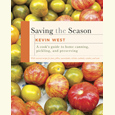 July 17, 2013 Kevin West’s Saving the Season is an extraordinary achievement, a gorgeous and thorough compendium on the subject of canning, pickling, and preserving all manner of fruits and vegetables. And if you’re less an aspiring chef than someone who likes to devour good writing about food, there are bountiful literary treats tucked into these pages, too. West will appear at
July 17, 2013 Kevin West’s Saving the Season is an extraordinary achievement, a gorgeous and thorough compendium on the subject of canning, pickling, and preserving all manner of fruits and vegetables. And if you’re less an aspiring chef than someone who likes to devour good writing about food, there are bountiful literary treats tucked into these pages, too. West will appear at 
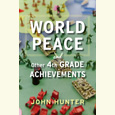 July 1, 2013 John Hunter is the inventor of the World Peace Game, a classroom activity in which students take on the roles of national leadership in all its complexities and conflicts. Along the way, they learn problem-solving and critical-thinking skills, how to work together, and how to handle a bully. And, yes, maintain world peace. John Hunter will discuss his new book, World Peace and Other 4th-Grade Achievements, at
July 1, 2013 John Hunter is the inventor of the World Peace Game, a classroom activity in which students take on the roles of national leadership in all its complexities and conflicts. Along the way, they learn problem-solving and critical-thinking skills, how to work together, and how to handle a bully. And, yes, maintain world peace. John Hunter will discuss his new book, World Peace and Other 4th-Grade Achievements, at 
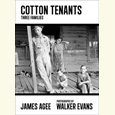 June 25, 2013 In 1936, James Agee wrote an article for Fortune that was never published in the magazine but eventually became his landmark book with photographer Walker Evans, Let Us Now Praise Famous Men. Presumed lost until it was uncovered in Agee’s papers in 2003, the original article—with a new selection of Evans’s photos—has just been released as Cotton Tenants: Three Families, a graceful and impassioned piece of journalism that powerfully conveys the human cost of a cruel economic system.
June 25, 2013 In 1936, James Agee wrote an article for Fortune that was never published in the magazine but eventually became his landmark book with photographer Walker Evans, Let Us Now Praise Famous Men. Presumed lost until it was uncovered in Agee’s papers in 2003, the original article—with a new selection of Evans’s photos—has just been released as Cotton Tenants: Three Families, a graceful and impassioned piece of journalism that powerfully conveys the human cost of a cruel economic system. June 18, 2013 In Liminal Zones: Where Lakes End and Rivers Begin Kim Trevathan chronicles his kayak and canoe journeys upstream from flatwater, current-less lakes and reservoirs to places where rivers rise above the flooding and come alive. In this book that is both narrative and meditative, Trevathan samples rivers from Massachusetts to California to South Carolina, but he keeps returning to the rivers of Tennessee and Kentucky, his homeland.
June 18, 2013 In Liminal Zones: Where Lakes End and Rivers Begin Kim Trevathan chronicles his kayak and canoe journeys upstream from flatwater, current-less lakes and reservoirs to places where rivers rise above the flooding and come alive. In this book that is both narrative and meditative, Trevathan samples rivers from Massachusetts to California to South Carolina, but he keeps returning to the rivers of Tennessee and Kentucky, his homeland.